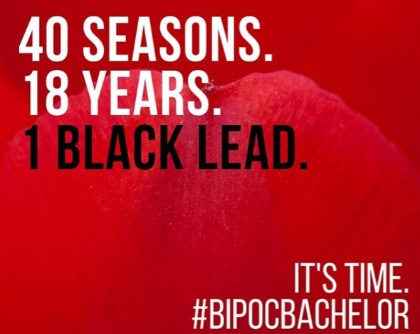In the wake of the murder of George Floyd and Breonna Taylor, two of the more recent names of innocent Black lives lost due to police brutality, countless petitions have been circulating to reach mayors and other state/city-level positions of power to demand justice for these murders and to abolish the police. As a white woman, any apologies or changes are not mine to accept, but I do know that moves are being made; officers are being arrested, major policies are in the early stages of development, and folks of all races and backgrounds have been showing up either at protests or by signing petitions and donating money.
In the periphery have been more microcosmic movements related to the amplification of Black voices, and one of these venues for change is very near and dear to my heart. The people, now more than ever, are demanding Black leads and more overall diversity in The Bachelor franchise.
40 Seasons. 18 Years. 1 Black Lead.
The description of the Change.org campaign begins:
ABC and Warner Bros. have been producing Bachelor content for 18 years. During that time they’ve cast 40 season leads, yet only one Black lead. This is unacceptable. As creators of one of the most popular and influential franchises on television, ABC and Warner Bros. have an opportunity and responsibility to feature Black, Indigenous, People of Color (“BIPOC”) relationships, families, and storylines. The franchise, and all those who represent it, should reflect and honor the racial diversity of our country—both in front of and behind the camera.
Rachel Lindsay, the first and only Black lead, has been admirably vocal during this time, even holding other members of Bachelor Nation accountable. For example, when Season 15 Bachelorette lead Hannah Brown drunkenly rapped along to the N-word in an Instagram live, Rachel encouraged her to own up to what she did right away. This came before the death of George Floyd, after which Rachel became even more vocal. On her Instagram, where she has been posting and reposting images and words in support of the Black Lives Matter movement, she has been linking to her blog, Honestly Rach. In her June 8th post, she addresses the call for more diversity on the Bachelor.
One thing she mentions is the fact that she had never watched previous seasons before her appearance on the show. She writes, “It is not because I am not a fan of reality television, because I watch a good share of that on the weekly. It is because black people know historically and presently that the show is not formatted for their success.” This might be a hard pill to swallow for the white Bachelor fans who put the show on a high pedestal as a great and damn entertaining way to find love. However, Rachel is 100% correct, and more of us need to accept the fact that one of our favorite programs is immensely flawed.
When discussing being the Bachelorette, Rachel says that she knew the role was bigger than herself; she wanted to be a trailblazer. Despite having high hopes for the diversity in following seasons, Rachel, like many of us, was disappointed; “I am sad to say that after almost four years in the franchise, we still don’t have the diversity that this show needs, and that our audience deserves.” And thus opens another difficult discussion: even when there is a more diverse cast, will the lead be genuinely interested in dating outside their own race? Rachel was; she and Bryan, who is Colombian (and immediately won Rachel over by introducing himself in Spanish) are happily married now!
But the potentially uncomfortable question more so falls on the white leads. In recent seasons, there have only been a few Black contestants to crack the top five. We have Wills Reid, Bachelor Nation’s best-dressed, who made it to Week 7 out of 10 on Becca Kufrin’s season. Meanwhile, Becca’s now-fiancé Garrett Yrigoyen is known for liking transphobic and xenophobic Instagram posts and more recently for posting both a black square and then a 200-word post defending and praising the police. And then, of course, we have Mike Johnson from Hannah Brown’s season, who was the favorite to be the next Bachelor, or so we thought until Pilot Pete was selected for the role instead. And what a “finasco” that was.
Is there still hope for potential leads like Mike or Wills? Social media (and this includes myself) would say absolutely. While many have learned not to invest too much trust in white-dominant organizations like The Bachelor, the campaigns are sparking a lot of conversations. Currently, members of Bachelor Nation are directing their followers’ attention to the Instagram account @bachdiversity, who has been using the hashtag #BIPOCBachelor to spread the demand for anti-racism in the franchise.
Users in the comments of their posts have been pointing attention to a much older account, @2blackgirls1rose, a duo of Black women who aim to “invade the whitest show on earth.” Their podcast, which is linked in their bio, along with their social media posts, offer hot takes on the show from the perspective of their underrepresented demographic. Their recent episode is called “Dear White Liberals,” and a featured quote reads, “As a Black person, I don’t have the energy to sit down with your racist aunt or my racist coworker. That’s your job.” I myself am not usually a podcast person, but this seems like the perfect place to start, especially as a white woman who’s been enjoying The Bachelor for years without feeling excluded for my race.
Fellow non-BIPOC, I urge you to use any platform you have to lift the voices of Black people and to demand change. Sign these petitions, donate to these causes, and amplify anti-racist movements—and do not stop!
